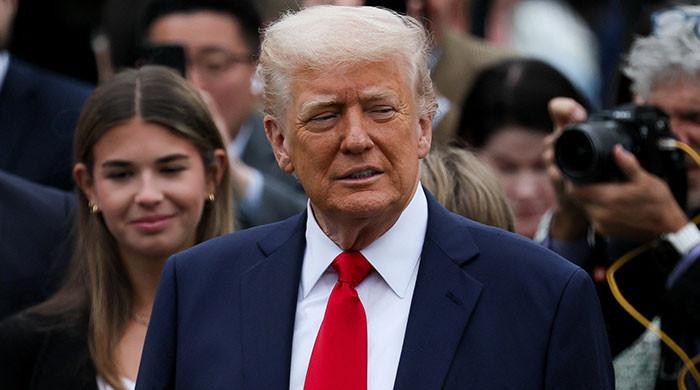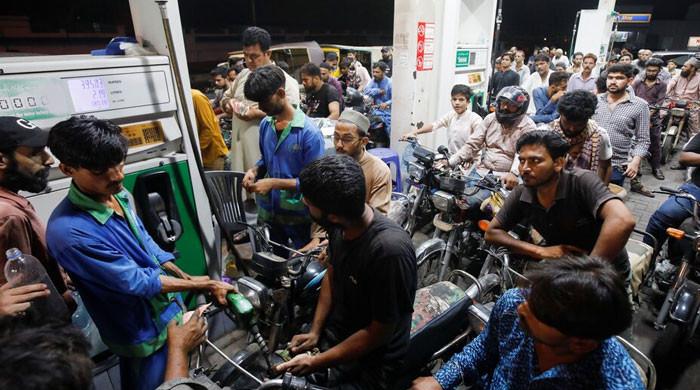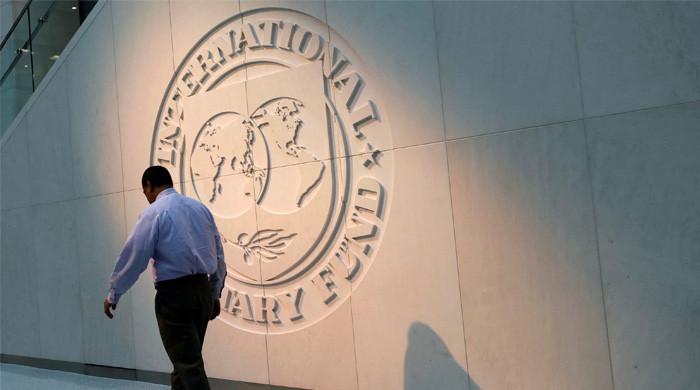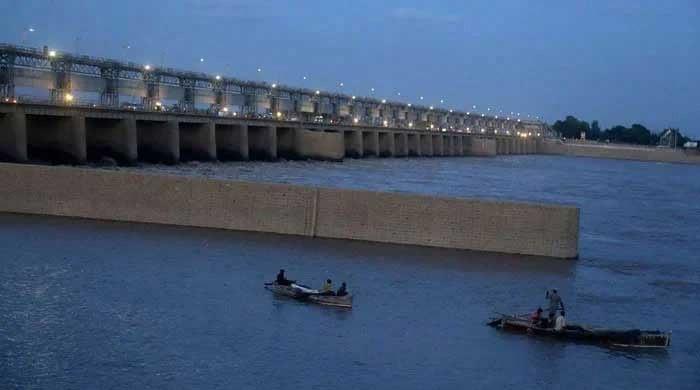Stop the canals
Country's largest and longest river is lifeline for millions, any downstream water scarcity will hamper growth and development
April 27, 2025
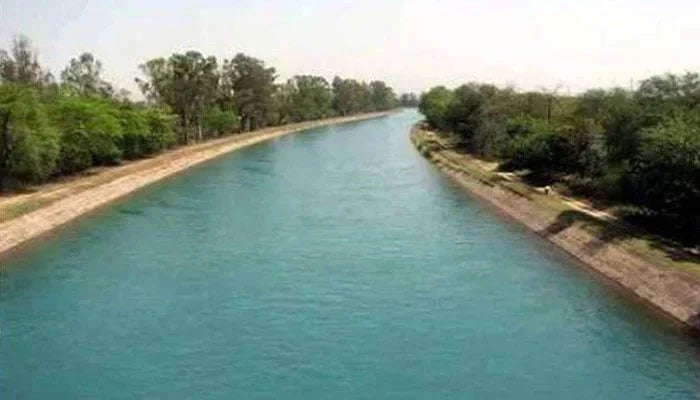
The prime minister has summoned the meeting of the Council of Common Interests (CCI) on May 2, promising that no new waterways will materialise if the members of the CCI fail to reach an agreement on this issue. Bilawal Bhutto Zardari also appeared sanguine after this agreement with the PM.
Rumours had been circulating about a possible split between the PML-N and the PPP, which could then rupture the coalition government.
At least for the time being, though, the PPP appears to be willing to go along with the Shehbaz government without rocking the boat. Though the PPP is celebrating Sindh's victory on the issue of new canals, the demonstrations and protests are not likely to wither away so soon. Sindh has witnessed some of the biggest and longest protests by political activists of all hues across the province in the past couple of months.
It is worth recalling that on February 15, a new project was inaugurated under the Green Pakistan Initiative (GPI). The project claimed to offer the farmers of Punjab high-yield seeds and machinery on rent to improve crop output and the chief minister highlighted the need for tackling food security challenges. It is an ambitious agricultural initiative to irrigate barren land in Punjab's Cholistan area. The project also claimed to offer scientific support to increase the yield of the farmers' crops.
Even then, the PPP and other political parties had expressed serious reservations over the plan to draw new canals from the Indus River to meet the irrigation needs of GPI, but the authorities did not take those objections seriously. The inauguration ceremony took place at the Kandai and Chapu areas of Cholistan, which are mostly barren lands at the moment. Some of the main components of the project are the Green Agri Mall and Service Company, Smart Agri Farm and Agri Research and Facilitation Centre. The Green Agri Mall and Service Company will be a "one-stop solution" for farmers, providing them fertilisers, pesticides and fuel at subsidised rates.
The Smart Agri Farm will span over 5,000 acres and will use a "highly efficient irrigation system" whereas the Agri Research and Facilitation Centre is likely to provide technical input and laboratory services to farmers in collaboration with academic and research institutes across Pakistan to improve agricultural output. The Punjab government has launched several projects to support farmers, including the Kissan Card, Green Tractor Programme, solarisation of agriculture tube-wells and the provision of super seeders to combat smog, and so far no one has ever objected to these initiatives.
So the question is, if all other steps by the Punjab government did not spark any demonstrations in Sindh, why were there so many protests against the new project? The website of Green Agri Mall says that it is a subsidiary of the GPI focusing on two primary missions: ensuring national food security and unlocking export potential in the agriculture sector.
The question is: how have we moved from "national security" to food security? Second, not far from Cholistan there was an Agricultural Research Station at Khanpur — established in 1950 — that moved to Bahawalpur in 1969 and became the Regional Agriculture Research Institute (RARI) in 1987.
The RARI website claims this institute is playing a vital role in raising awareness in the farming community in the region by providing improved production and protection technology, "in consort with evaluation of high-yielding, high fertiliser responsive, pest and disease resistant and well-suited varieties of various crops for the region."
The institute boasts "three major divisions viz crop breeding, agronomy, soil chemistry and plant protection". Has the Punjab government ever evaluated the performance of this institute and how far it has contributed to agricultural development in the region? If this institute is not performing well, why has it been allowed to function for decades without any substantial contribution? If it has been doing well, why was there a need to establish yet another research centre with public money?
On the one side, the government is shutting down utility stores and curtailing jobs in the name of downsizing and on the other hand, not doing proper homework to assess the performance of existing institutions.
But a greater question is about the proposed network of six canals that the authorities are planning to build across the country to irrigate millions of acres of barren land as part of the GPI, worth billions of dollars. Initially, an oft-repeated "game changer’ mantra we heard ad nauseam about the proposed canals was that they would transform "vast desert lands into fertile farmland". The mega project that aims to dig canals is highly likely to cause water shortages in Sindh; moreover, the project never sought any consent from all relevant stakeholders.
The canal project will further stress Pakistan’s river system, which has witnessed decreasing water levels due to climate change, overexploitation and other factors. That fear prompted widespread demonstrations in nearly all major cities, including Karachi. The authorities should have realised much earlier that water allocation has long been a political flashpoint in the country and the low riparian areas have always feared that losing water to upstream canals and developments would likely result in a disaster, especially for Sindh.
The country's largest and longest river is a lifeline for millions of people, and any downstream scarcity of water will hamper their growth and development in the region.
Thousands of people took to the streets and paralysed interprovincial traffic so that the authorities would pay some heed to their concerns. The demonstrations saw miles-long processions of people from all walks of life – from activists, banana growers, civil society members, college students and teachers to development professionals, entrepreneurs, faith healers and farmers.
The protesters have been railing against the proposed canal system that is definitely going to reduce Sindh's water share. The Indus water system provides water for agriculture and drinking purposes. Agriculture is the backbone of Sindh’s economy and employment, greatly dependent on fertile lands that get irrigation from the Indus River.
A new plan to convert wastelands into cultivable farmlands will harm the interests of already existing farmlands in Sindh. The proponents of this project claim that they have identified as much as nearly two million hectares of barren lands across Pakistan, and making that cultivable would provide employment opportunities to over 50,000 people.
The question is about the millions of people downstream who will face the adverse impact of this project. Those who wield the ultimate influence in nearly all matters in the country must not overlook the drastic fallout of the controversial project.
Digging canals for "target crops" while leasing land for 30 years through various business models — in which large-scale foreign and local investors will get at least 1,000 acres each — is corporate farming that will consume a lot of water and destroy already cultivable land down the Indus stream. Interestingly, President Asif Ali Zardari approved the "six strategic canals" in July 2024 for "simultaneous execution" and even urged consistent funding from both federal and provincial governments, notwithstanding some of the PPP leaders already raising concerns about these canals.
Of the six proposed canals, the Cholistan Canal is the most critical and largest project, stretching over 175 kilometres. The authorities planned to complete it by mid-2030 at a cost of nearly $800 million; it is likely to end up consuming nearly a billion dollars with increasing costs, as it happens with most government projects. Nearly a million acres of the Cholistan desert will require huge volumes of water that is already scarce.
All said and done, now the CCI must stop this project and find some alternative solutions, such as groundwater extraction that many water experts have been suggesting for long.
The writer holds a PhD from the University of Birmingham, UK. He posts @NaazirMahmood and can be reached at: [email protected]
Disclaimer: The viewpoints expressed in this piece are the writer's own and don't necessarily reflect Geo.tv's editorial policy.
Originally published in The News







